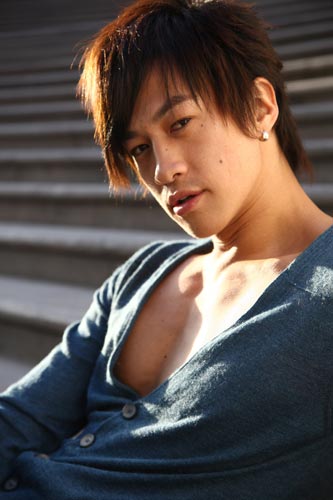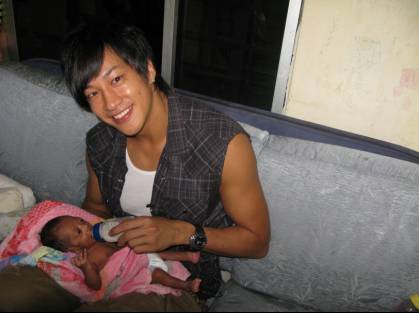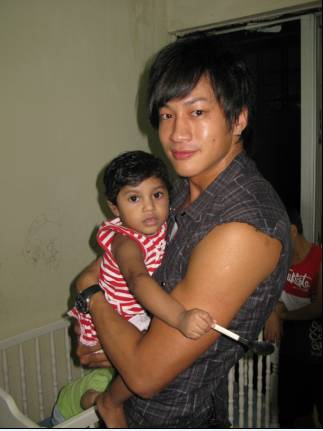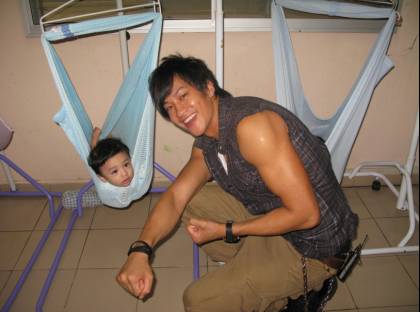Sophie’s revenge – Newest film of Peter
This is the newest film of Peter, our dear idol.
Cast: Peter Ho, Zhang Zi Yi, So Ji Sub, Ruby Lin…
This is some pictures of this promising film (It is still filming)
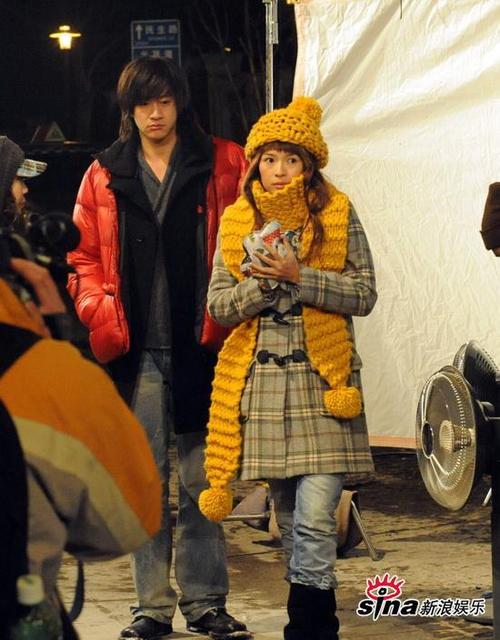
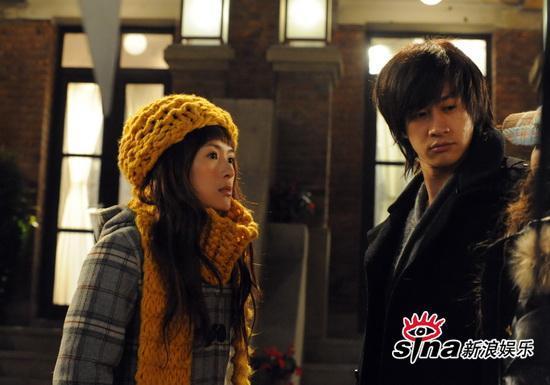
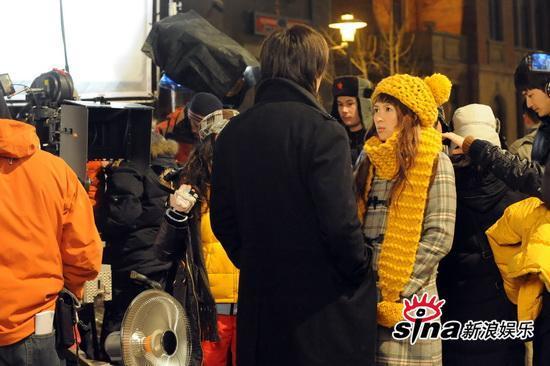
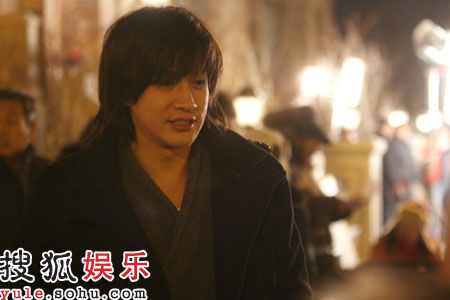
Happy new year 2009!!!
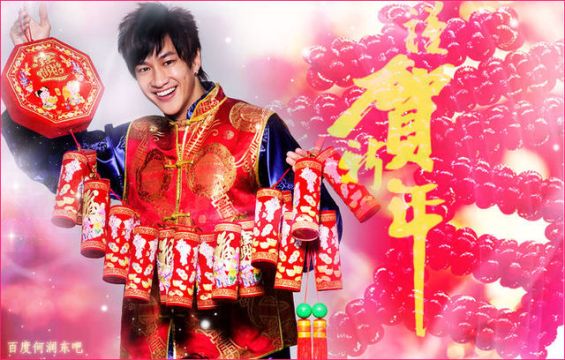
Today is the New Year’s Eve! And I’d like to thank you all for stick with me with this dear fansite, with Peter. Thank you very much.
I wish you all would have a happy new year, with lots of fun and happiness. And I hope you will always love Peter and stand by him in his road of success.
For Peter:
This is a brand new year, a brand new chance for you to shine. I just want you to know that, I will always be here, in Vietnam and stand by your side. I’m one of your biggest fans in Vietnam, you kno.
You are a really bright star. And I wish this year, that star would shine and shine and shine…
I will always love you!
Happy new year 2009!
Merry Christmas!
 December 25, 2008
December 25, 2008
Filed under Uncategorized
Tags: Merry Christmas, Peter Ho warm holy night
I hope this year, Peter can enjoy a warm and happy Christmas holiday! He is still busy doing his new project, “Bubble Summer” and I really wish he would not be exhausted because of it.
Merry Christmas to all of you, Peter’s dearest fans around the world. You guys are really great, you know?
Merry Christmas!!!
The Butterfly Lovers pictures
Because the movie “The Butterfly Lovers” is now very hot, I think I have to write one new topic for the cute and awesome pictures of this movie. I hope you guys will like it.
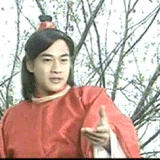
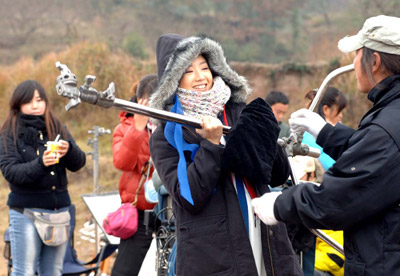
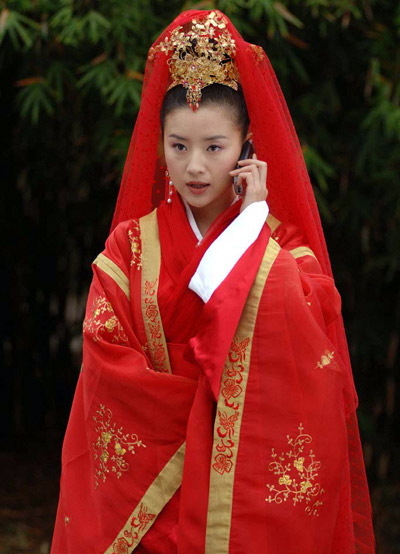
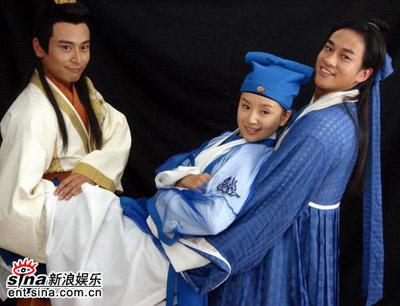
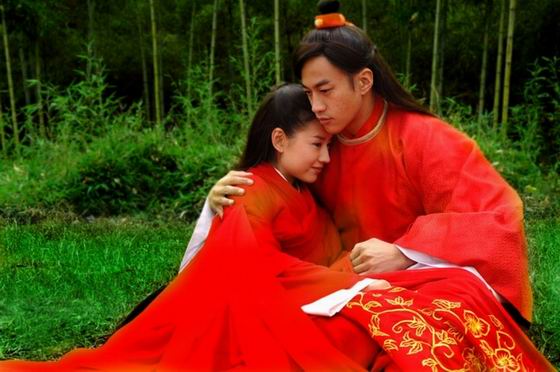 \
\
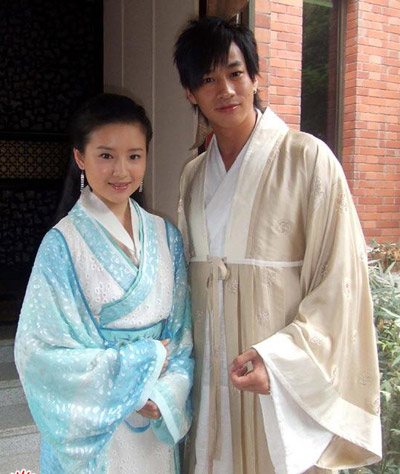
Peter’s blog about his charity (part 2) – warm and touched images
She went so far as I do not drink the milk
This time I have a new mandate, so as to the identity of the postman forward to Malaysia, the postman love! I hope this can help the kindness welfare center in Kuala Lumpur raised, so that they can be on August 8 of a fire, rebuild their homes. And raise the children so that some of the funds can continue their studies. Oi welfare centers are busy, he’s inside the small members of the baby until Qi Bashi-year-old men are old. I long ago from the earliest stages of life came into contact with them – nurseries, which is the most I have a grasp of the region, in general I would like to see the children to see Ronald McDonald as the smile from ear to ear. But did not expect, I am the first to come into contact with a small baby so small! He has just one month old! I totally beyond the scope of the effective! He would like to talk a good relationship with his arms to feed him milk, soft Hong Hong him, he did not expect not to face me in my arms crying, I fear a complete, no I think for the first time when Daddy, it was lovely to the children of the KO. However, he could finally see my helpless eyes, so I decided to put a horse. With a smile in response to my.
Later, I saw about a 4-year-old girl, but she found that both sides have a deep scar on his elbow. I know that when he encountered the time I am very shocked that his mother once all of a sudden psychiatric disorders, and then living on this little girl has a broken elbow also. The little girl came into the human world to more than 1000 days, we have experienced live for decades may not have to face the tragedy, as well as torture. Fortunately, there is love from her well-being centers of domestic violence rescue the environment.
Love each and every welfare center for children behind the tragic story. However, they are very strong, they have to learn not to turn their back on their own to see behind the story, but the big step forward. So I hope that through my shopping in the afternoon of fund-raising, as well as we continue to love, you can give these children a strong wings so that they can fly their own dreams.
“The Butterfly Lovers” OST and lyrics
For your own convenience, I seperate this topic from “The Butterfly Lovers” topic. I hope you guys will enjoy the OST and lyrics of this so so nice movie.
To listen to the OST, try these links: (you can even download them) ^^:
“Yuan fang”: http://www.mp3.zing.vn/mp3/nghe-bai-hat/Phuong-Xa-Hong-Bo-Dieu-Ly-Duyet-Quan.IWZD088W.html
“Shuang fei”: http://www.mp3.zing.vn/mp3/nghe-bai-hat/Song-Phi-Ha-Nhuan-Dong.IWZD088I.html
“Ling hua jing”: http://www.mp3.zing.vn/mp3/nghe-bai-hat/Lang-Hoa-Kinh-Ly-Duyet-Quan.IWZD088O.html
01. 远方 – 红布条 & 李悦君
怎奈黎明不懂哀伤,双人成单
谁能忘记那段时光,离别容易再见难
风吹不动沧桑
雨轻弹在眼眶
这世界还有谁温暖
我在远方,盼到心慌,山海苍茫,触晠 ?情伤
我在远方,相思更漏短,泪湿白衣裳
我在远方,花落心残,生亦何欢,死习 ?难安
我在远方,伤心倚栏杆,等到人断肠
你在远方
我在远方,想起过往,心薄裘寒,泪眠 ?凝霜
我在远方,最是情难忘,忍不住惆怅
我在远方,惜君如常,天上人间,蝶舠 ?成双
我在远方,魂与梦为伴,千古共向晚
你在远方
Yuan fang – Hong Bu Tiao & Li Yue Jun
Zen nai li ming bu dong ai shang,shuang ren cheng dan
Shei neng wang ji na duan shi guang,li bie rong yi zai jian nan
Feng chui bu dong cang sang
Yu qing tan zai yan kuang
Zhe shi jie hai you shei wen nuan
Wo zai yuan fang,pan dao xin huang,shan hai cang mang,chu jing qing shang
Wo zai yuan fang,xiang si geng lou duan,lei shi bai yi chang
Wo zai yuan fang,hua luo xin can,sheng yi he huan,si ye nan an
Wo zai yuan fang,shang xin yi lan gan,deng dao ren duan chang
Ni zai yuan fang
Wo zai yuan fang,xiang qi guo wang,xin bo qiu han,lei yan ning shuang
Wo zai yuan fang,zui shi qing nan wang,ren bu zhu chou chang
Wo zai yuan fang,xi jun ru chang,tian shang ren jian,die wu cheng shuang
Wo zai yuan fang,hun yu meng wei ban,qian gu gong xiang wan
Ni zai yuan fang
Phương xa – Hồng Bố Điều & Lý Duyệt Quân (Đầu phim) 


Tiếc rằng ánh bình minh không thấu hiểu nỗi đau thương, khiến hai người đi về hai ngã
Ai có thể quên được khoảng thời gian đó, biệt ly quá dễ dàng mà tương ngộ lại thật khó khăn
Gió không thổi hết tang thương
Mưa đong đầy trong khóe mắt
Thế gian này còn ai là người sưởi ấm
Ta ở phương xa, trông ngóng đến bàng hoàng, trời đất mênh mông, nhìn cảnh lòng đau như cắt
Ta ở phương xa, nỗi tương tư càng thêm khắc khoải, lệ tuôn ướt đầm manh áo trắng
Ta ở phương xa, nhìn hoa rơi, cõi lòng tan nát, sống có gì vui, chết cũng không thanh thản
Ta ở phương xa, đau lòng tựa cửa, đợi chờ người đến tím ruột bầm gan
Người ở phương xa
Ta ở phương xa, nhớ về dĩ vãng, trái tim băng giá, lệ đọng thành sương
Ta ở phương xa, tình yêu thật khó phai mờ, không nén được nỗi thương tâm
Ta ở phương xa, mãi tiếc nhớ người xưa, giữa trời đất nhân gian, bướm thành đôi bay lượn
Ta ở phương xa, linh hồn bầu bạn cùng giấc mộng, muôn đời vẫn mãi hướng về nhau
Người ở phương xa
09. 菱花镜 – 李悦君
一杯伤心酒 两滴相思泪
到如今 菱花镜里空憔悴
莫问当年朱颜带绿翠
只怨谁错把鸳鸯配
芳华任谁贪 凭君枝头占
不承望 花飞粉谢珠落散
待得来日霜鬓垂肩乱
回头看 不见来时伴
Ling hua jing – Li Yue Jun
Yi bei shang xin jiu liang di xiang si lei
Dao ru jin ling hua jing li kong qiao cui
Mo wen dang nian zhu yan dai lv cui
Zhi yuan shei cuo ba yuan yang pei
Fang hua ren shui tan ping jun zhi tou zhan
Bu cheng wang hua fei fen xie zhu luo san
Dai de lai ri shuang bin chui jian luan
Hui tou kan bu jian lai shi ban
Lăng hoa kính – Lý Duyệt Quân (Mối tình Bát ca Chúc Anh Tề & Hoàng Lương Ngọc)
Một chung rượu thương tâm, hai giọt lệ tương tư
Đến nay, trong lăng hoa kính là gương mặt héo mòn tiều tụy
Chớ hỏi đâu người thiếu nữ kiều diễm đeo ngọc lục bảo năm nào
Chỉ trách kẻ đã sai lầm khi kết hợp uyên ương
Ai chẳng ham muốn sắc đẹp thanh xuân, song chỉ mình chàng có thiếp
Nào ngờ hoa rụng, phấn rơi, ngọc châu phân tán
Đợi đến ngày mái tóc pha sương buông xõa xuống bờ vai
Quay đầu nhìn lại không còn thấy bạn chung tình năm cũ
18. 双飞 – 何润东
无论来世再相约今生就要无恨无悔
不问前缘我是谁只管今成和你日日月朠 ?
我愿与你雪中泥红尘寸寸泥中血
冷暖相随悲欢同类
朝朝暮暮相依偎
我是萍你是水
相逢相爱不是罪
地久哭天长泪
为你染红我的血
我愿与你双双飞
我愿与你双双飞
今生有了你我梦一回
来世等你将我醉
我愿与你双双飞
飞离红尘是与非
人间痴情迢迢不归路
不如天上比翼蝶
Shuang fei – He Run Dong (Peter Ho’s song)
Bu deng lai shi zai xiang yue jin sheng jiu yao wu hen wu hui
Bu wen qian yuan wo shi shei zhi guan jin cheng he ni ri ri yue yue
Wo yuan yu ni xue zhong ni hong chen cun cun ni zhong xie
Leng nuan xiang sui bei huan tong lei
Zhao zhao mu mu xiang yi wei
Wo shi ping ni shi shui
Xiang feng xiang ai bu shi zui
Di jiu ku tian chang lei
Wei ni ran hong wo de xue
Wo yuan yu ni shuang shuang fei
Wo yuan yu ni shuang shuang fei
Jin sheng you le ni wo meng yi hui
Lai shi deng ni jiang wo cui
Wo yuan yu ni shuang shuang fei
Fei li hong chen shi yu fei
Ren jian chi qing tiao tiao bu gui lu
Bu ru tian shang bi yi die
Song phi – Hà Nhuận Đông (Cuối phim)
Dù đến kiếp sau sẽ lại cùng ước hẹn nhưng chỉ cần kiếp này không oán không hận
Đừng hỏi duyên phận kiếp trước ta là ai, chỉ cần kiếp này được ở bên nàng ngày ngày tháng tháng
Ta nguyện cùng nàng làm lớp bùn trong băng tuyết, làm máu nhuộm đỏ chốn hồng trần
Ấm lạnh có nhau, vui buồn cùng san sẻ
Sớm chiều nương tựa kề bên
Ta là bèo, nàng là nước
Gặp gỡ rồi yêu nhau không phải là tội lỗi
Đất mãi khóc than, trời cứ tuôn dòng lệ
Vì nàng, nhuộm đỏ máu ta
Ta nguyện cùng nàng sóng đôi tung cánh lượn bay
Ta nguyện cùng nàng sóng đôi tung cánh lượn bay
Kiếp này có nàng, ta đã mơ một giấc mộng
Kiếp sau sẽ lại đợi chờ nàng đến khiến lòng ta say đắm
Ta nguyện cùng nàng sóng đôi tung cánh lượn bay
Rời xa chốn hồng trần đầy rẫy thị phi
Nhân gian si tình vạn dặm xa xăm không lối về
Chi bằng làm đôi bướm bay lượn giữa trời xanh
The story of “Three kingdoms”
Credit: wikipedia
Original link: http://en.wikipedia.org/wiki/Three_Kingdoms
For other uses, see
traditional Chinese: 三國; simplified Chinese: 三国; pinyin: Sānguó) is a period in the history of China, part of an era of disunity called the Six Dynastiesde facto power of the Han Dynasty emperors. In a strict academic sense it refers to the period between the foundation of the Wei in 220 and the conquest of the Wu by the Jin Dynasty in 280. However, many Chinese historians and laymen extend the starting point of this period back to the uprising of the Yellow Turbans following immediately the loss of
The three kingdoms were
Wèi (魏), Shǔ (蜀), and Wú (吳). To help further distinguish these states from other historical Chinese states of the same name, historians add a relevant character: Wei is also known as Cáo Wèi (曹魏), Shu is also known as Shǔ Hàn (蜀漢), and Wu is also known as Dōng Wú or Eastern Wu (東吳). The term Three Kingdoms itself is somewhat a mistranslation, since each state was eventually headed by an emperor who claimed legitimate succession from the Han Dynasty, not by kings. Nevertheless the term has become standard among sinologists
The earlier, “unofficial” part of the period, from 190 to 220, was marked by chaotic infighting between warlords in various parts of
China. The middle part of the period, from 220 and 263, was marked by a more militarily stable arrangement between three rival states, Cao Wei, Shu Han, and Eastern Wu. The later part of this period was marked by the collapse of the tripartite situation: first the destruction of Shu by Wei (263), then the overthrow of Wei by the Jin Dynasty
(265), and the destruction of Wu by Jin (280).
Although relatively short, this historical period has been greatly romanticised in the
cultures of China, Japan, Korea, and Vietnam. It has been celebrated and popularised in operas, folk stories, novels and in more recent times, films, television serials, and video games. The best known of these is undoubtedly the Romance of the Three KingdomsChen Shou‘s Sanguo Zhi, a fictional account of the period which draws heavily on history. The authoritative historical record of the era is
, along with Pei Songzhi’s later annotations of the text.
The Three Kingdoms period is one of the bloodiest in
Chinese history. A population census in late Eastern Han Dynasty reported a population of approximately 50 million,[1] while a population census in early Western Jin Dynasty (after Jin re-unified China) reported a population of approximately 16 million.[1]
Even after taking into account possible inaccuracies of these census reports, a large percentage of the population was wiped out during the constant wars waged during this period.
Technology advances significantly during this period.
Zhuge Liang invented the wooden ox, suggested to be an early form of the wheelbarrow. A brilliant mechanical engineer known as Ma Jun, in the Kingdom of Wei, is considered by many to be as brilliant as his predecessor Zhang Heng. He invented a hydraulic-powered, mechanical puppet theatre designed for Emperor Ming of Wei (Cao Rui), square-pallet chain pumps for irrigation of gardens in Luoyang, and the ingenious design of the South Pointing Chariot, a non-magnetic directional compass operated by differential gears.
Three Kingdoms (disambiguation)
Collapse of dynastic power
What is traditionally thought of as the beginning of the “unofficial” Three Kingdoms Period is the Yellow Turban Rebellion led by Zhang Jiao in 184. The year long revolt devastated northern China, as Zhang’s religious sect, the Way of Peace, battled the weakened Han Empire, whose army was led by He Jin. The Way of Peace was primarily composed of farmers who had suffered greatly under the corrupt government system and thus easily converted by Zhang Jiao to create a “new and peaceful world.” The rebellion ended when Zhang Jiao died of illness, but the chaos the rebellion wrought, when combined with the natural disasters that had overrun China in the same period, destabilized the Han Dynasty and doomed it to fall. The rebellion also caused the central government to increase the allowance of military power of the local governments, which is one of the causes of the warring period that followed.
The series of events leading to the collapse of dynastic power and the rise of Cáo Cāo are extremely complex. The death of Emperor Ling in May 189 led to an unstable regency under General-in-chief He Jin and renewed rivalry between the factions of the eunuchs and regular civil bureaucracy. Following the assassination of He Jin, his chief ally the Colonel-Lieutenant of Retainers Yuan Shao led a massacre of the eunuchs in the imperial palaces in Luoyang. This event prompted the invitation of frontier general Dong Zhuo to enter Luoyang from the northwest boundary of China. At the time China faced the powerful barbarians of Qiang tribe to the northwest, and thus Dong Zhuo controlled a large army with elite training. When he brought the army to Luoyang, he was able to easily overpower the existing armies of both sides and took control of the imperial court, ushering in a period of civil war across China.
Dong Zhuo then manipulated the succession so that the future Emperor Xian could take the throne in lieu of his elder half-brother. Dong Zhuo, while ambitious, genuinely wished for a more capable emperor. On his way to Luoyang, he encountered a small team of soldiers protecting the two sons of Emperor Ling fleeing the war zone. In the encounter, Dong Zhuo acted arrogantly and threatening, causing the elder half-brother to be paralyzed with fear; the younger brother, future Emperor Xian, responded calmly with authority and commanded Dong Zhuo to protect the royal family with his army to return to the Imperial Court.
While Dong Zhuo originally wanted to re-establish the authority of Han Empire and manage all the political conflict properly, his political capability proved to be much worse than his military leadership. His behaviour grew more and more violent and authoritarian, executing or sending into exile all that opposed him, and showed less and less respect to the Emperor. He ignored all royal etiquette and openly carried weapons into the imperial court frequently. In 190 a coalition led by Yuan Shao was formed between nearly all the provincial authorities in the eastern provinces of the empire against Dong Zhuo. The mounting pressure from repeated defeat on the southern frontline against the Sun Jian forces drove the Han Emperor and later Dong Zhuo himself west to Chang’an in May 191.
Dong Zhuo once again demonstrated his political shortcomings by forcing millions of residents of Luoyang to migrate to Chang’an. He then set fire to Luoyang, preventing occupation by his enemies and destroying the biggest city in China at that time. In addition, he ordered his army to slaughter a whole village of civilians. The soldiers beheaded civilians and carried their heads into Chang’an to show off as war trophies, pretending to have had a great victory against his enemies. A year later Dong Zhuo was killed in a coup d’etat by Wang Yun and Lü Bu.
Rise of Cao Cao:
In 191, there was some talk among the coalition of appointing Liu Yu, an imperial relative, as emperor, and gradually its members began to fall out. Most of the warlords in the coalition, with a few exceptions, sought the increase of personal military power in the time of instability instead of seriously wishing to restore the Han Dynasty’s authority. The Han empire was divided between a number of regional warlords. Yuan Shao occupied the northern area of Ye and extended his power, by taking over his superior Han Fu with trickery and intimidation, north of the Yellow River against Gongsun Zan, who held the northern frontier. Cáo Cāo, directly to Yuan’s south, was engaged in a struggle against Yuan Shu and Liu Biao, who occupied respectively the Huai River basin and Middle Yangzi regions. Further south the young warlord Sun Ce, taking over after the untimely death of Sun Jian, was establishing his rule in the Lower Yangzi, albeit as a subordinate of Yuan Shu. In the west, Liu Zhang held Yizhou province while Hanzhong and the northwest were controlled by a motley collection of smaller warlords such as Ma Teng of Xiliang, the original post of Dong Zhuo.
Dong Zhuo, confident in his success, was slain by his own adopted son, Lu Bu and his father-in-law Wang Yun. Lu Bu, in turn, was attacked by Dong Zhuo’s supporters, Li Jue, Guo Si, Zhang Ji (Zhang Xiu’s Uncle) and Fan Chou. Wang Yun and his whole family were executed. Lu fled to Zhang Yang, a northern warlord, and remained with him for a time before briefly joining Yuan Shao, but it was clear that Lu Bu was far too independent to serve another.
In August 195, Emperor Xian fled the tyranny of Li Jue at Chang’an and made a year long hazardous journey east in search of supporters. By 196, when he was received by Cao Cao, most of the smaller contenders for power had either been absorbed by larger ones or destroyed. This is an extremely important move for Cao Cao with the suggestion from his primary advisor, Xun Yu, commenting that by supporting the authentic Emperor, Cao Cao would have the formal legal authority to control the other warlords and force them to comply in order to restore the Han dynasty.
Cao Cao, whose zone of control was the precursor to the Kingdom of Wei, had raised an army in the winter of 189. In several strategic movements and battles, he controlled the Dui province and defeated several factions of the Yellow Turban rebels. This earned him the aid of other local militaries controlled by Zhang Miao and Chen Gong, who joined his cause to create his first sizable army. He continued the effort and absorbed approximately 300,000 Yellow Turbans into his army as well as a number of clan-based military groups particular to the eastern side of Qing province. In 196 he established an imperial court at Xuchang and developed military agricultural colonies (tuntian) to support his army. Although the system imposed a heavy tax for hired civilian farmers (40% to 60% of agricultural production), the farmers were more than pleased to be able to work with relative stability and professional military protection in a time of chaos. This was later said to be his second important policy to success.
In 194, Cao Cao went to war with Tao Qian of Xuzhou, whose officers had executed his whole family. Tao Qian received the support of Liu Bei and Gongsun Zan, but even then, it seemed as if Cao Cao’s superior forces would overrun Xuzhou entirely. However, Cao Cao received word that Lu Bu had seized Yan province in Cao Cao’s absence, and thus, he retreated, putting a halt to hostilities with Tao Qian for the time being. Tao Qian died that same year, leaving his province to Liu Bei. A year later, in 195, Cao Cao managed to drive Lu Bu out of Yan. Lu Bu fled to Xuzhou and was received by Liu Bei, and an uneasy alliance began between the two.
In the south, Sun Ce, then an independent general under the service of Yuan Shu, defeated the warlords of Yangzhou, including Liu Yao, Wang Lang, and Yan Baihu. The speed with which Sun Ce accomplished his conquests led to his nickname, “Little Conqueror” (小霸王), a reference to the late Xiang Yu. In 197, Yuan Shu, who was at odds with Cao Cao, Yuan Shao, and Liu Bei, felt assured of victory with his subordinate’s conquests, and thus declared himself emperor of the Cheng Dynasty. The move, however, was a tactical blunder, as it drew the ire of many warlords across the land, including Yuan Shu’s own subordinate Sun Ce, who had advised Yuan Shu not to make such a move. Cao Cao issued orders to Sun Ce to attack Yuan Shu. Sun Ce complied, but first convinced Cao Cao to form a coalition against Yuan Shu, of which Liu Bei and Lu Bu were members. Attacked on all sides, Yuan Shu was defeated and fled into hiding.
Afterwards, Lu Bu betrayed Liu Bei and seized Xuzhou, forming an alliance with Yuan Shu’s remnant forces. Liu Bei fled to Cao Cao, who accepted him. Soon, preparations were made for an attack on Lu Bu, and the combined forces of Cao Cao and Liu Bei besieged Xia Pi. Lu Bu’s officers deserted him, Yuan Shu’s forces never arrived as reinforcements, and he was bound by his own officers Song Xian and Wei Xu and executed along with many of his officers. Thus, the man known as the mightiest warrior in the land was no more.
In 200, Dong Cheng, an officer of the Imperial Court, received a secret edict from the Emperor to assassinate Cao Cao. He collaborated with Liu Bei on this effort, but Cao Cao soon found out about the plot and had Dong Cheng and his co-conspirators executed, with only Liu Bei surviving and fleeing to the Yuan Shao in the north.
After settling the nearby provinces, including a rebellion led by former Yellow Turbans, and internal affairs with the court, Cao Cao turned his attention north to Yuan Shao, who himself had eliminated his northern rival Gongsun Zan that same year. Yuan Shao, himself of higher nobility than Cao Cao, amassed a large army and camped along the northern bank of the Yellow river.
In 200, after winning a decisive battle against Liu Biao at Shaxian and putting down the rebellions of Xu Gong and others, Sun Ce was struck by an arrow and fatally wounded. On his deathbed, he named his younger brother, Sun Quan, as his heir.
Following months of planning, Cao Cao and Yuan Shao met in force at Guandu. Overcoming Yuan’s superior numbers, (actual numbers vary in different sources, but Yuan Shao having a manifestly superior number is universally accepted) Cao Cao decisively defeated him by setting fire to his supplies, and in doing so crippled the northern army. Liu Bei fled to Liu Biao of Jing province, and many of Yuan Shao’s forces were destroyed. In 202, Cao Cao took advantage of Yuan Shao’s death and the resulting division among his sons to advance north of the Yellow River. He captured Ye in 204 and occupied the provinces of Ji, Bing, Qing and You. By the end of 207, after a lightning campaign against the Wuhuan barbarians, Cao Cao had achieved undisputed dominance of the North China Plain.
Red Cliffs and its aftermath:
In 208, Cao Cao marched south with his army hoping to quickly unify the empire. Liu Biao‘s son Liu Cong surrendered the province of Jing and Cao was able to capture a sizeable fleet at Jiangling. Sun Quan, the successor to Sun Ce in the Lower Yangzi, continued to resist however. His advisor Lu Su secured an alliance with Liu Bei, himself a recent refugee from the north, and Sun Ce’s sworn brother Zhou Yu was placed in command of Sun Quan’s navy, along with a veteran officer of the Sun family, Cheng Pu. Their combined armies of 50,000 met Cao Cao’s fleet and 200,000-strong force at Red Cliffs (Chinese: 赤壁 Chi Bi) that winter. After an initial skirmish, an attack beginning with a plan to set fire to Cao Cao’s fleet was set in motion to lead to a decisive defeat on Cao Cao, forcing him to retreat in disarray back to the north. The allied victory at Red Cliffs ensured the survival of Liu Bei and Sun Quan, and provided the basis for the states of Shu and Wu.
After his return to the north, Cao Cao contented himself with absorbing the northwestern regions in 211 and consolidating his power. He progressively increased his titles and power, eventually becoming the Prince of Wei in 217, a title bestowed upon him by the puppet Han emperor that he controlled. Liu Bei, having defeated the weak Jing warlords Han Xuan, Jin Xuan, Zhao Fan, and Liu Du, entered Yi province and later in 214 displaced Liu Zhang as ruler, leaving his commander Guan Yu in charge of Jing province. Sun Quan, who had in the intervening years being engaged with defenses against Cao Cao in the southeast at Hefei, now turned his attention to Jing province and the Middle Yangzi. Tensions between the allies were increasingly visible. In 219, after Liu Bei successfully seized Hanzhong from Cao Cao and as Guan Yu was engaged in the siege of Fan, Sun Quan’s commander-in-chief Lu Meng secretly seized Jing province, and his forces captured and slew Guan Yu.
Three emperors:
In the first month of 220, Cao Cao died and in the tenth month his son Cao Pi forced Emperor Xian to abdicate, thus ending the Han Dynasty. He named his state Wei and made himself emperor at Luoyang. In 221, Liu Bei named himself Emperor of Han, in a bid to restore the fallen Han dynasty. (His state is known to history as “Shu” or “Shu Han”.) In the same year, Wei bestowed on Sun Quan the title of King of Wu. A year later, Shu Han troops declared war on Wu and met the Wu armies at the Battle of Yiling. At Yiling, Liu Bei was disastrously defeated by Sun Quan’s commander Lu Xun and forced to retreat back to Shu, where he died soon afterward. After the death of Liu Bei, Shu and Wu resumed friendly relations at the expense of Wei, thus stabilizing the tripartite configuration. In 222, Sun Quan renounced his recognition of Cao Pi‘s regime and, in 229, he declared himself emperor at Wuchang.
Dominion of the north completely belonged to Wei, whilst Shu occupied the southwest and Wu the central south and east. The external borders of the states were generally limited to the extent of Chinese civilization. For example, the political control of Shu on its southern frontier was limited by the Tai tribes of modern Yunnan and Burma, known collectively as the Southern Barbarians (南蠻).
Welcome, new Peter’s fans!
Dear you guys!
I just read Marijana‘s comments and I was really happy! I don’t know if she liked Peter before or after she entered this site. But I am glad if she can be a member of this site.
This topic can be called as a place for fans to chat. If anyone has made an user name at WordPress, I’m sure will invite you guys to join this site. Thanks again.
Hey you guys, this is not Peter’s blog. This is just a fan blog that I – a big big fan of him from Vietnam made for him. If you guys want to share his news, photos, videos, anything, you can contact me at zinquynhanh@yahoo.com.vn and you can be admins of this small site, ok?
@Marijana: Hi! Can you sign up an account at WordPress? After make a new user name, tell me at zinquynhanh@yahoo.com.vn and I will invite you as an admin of this site. Thanks for your comments!
@Peter Ho fan: Hello! Thanks for your supports. If you want, you can be an admin of this site. I really need helps, because I’m the only one who develope this site. So it is so so nice if you can join me.
@mothz: Hi yo! You are so cute. I’ll add you to my Y!M. We can be friends!
Well, this is MY FAN BLOG FOR PETER, so I think you can’t talk to him. I don’t know if he has visited this site (although I sent him a link ^^) You can work with me, too. Nice to meet you.
PeterHoIloveYou blog is on its way to 1000 views
Thanks to you and my friend, Tran Thu Thuy, this wonderful site is going on its way to 1000 thousand views. Thank you all. 😡
When I and my friend, Lita made this site, we just wanted this site to be our own. We didn’t notice that there would be so many people visit it and support it. Thanks again, our supporters.
It’s 966 views now, and I hope you guys will come back here often.
Love,
Tecna Ho.
















